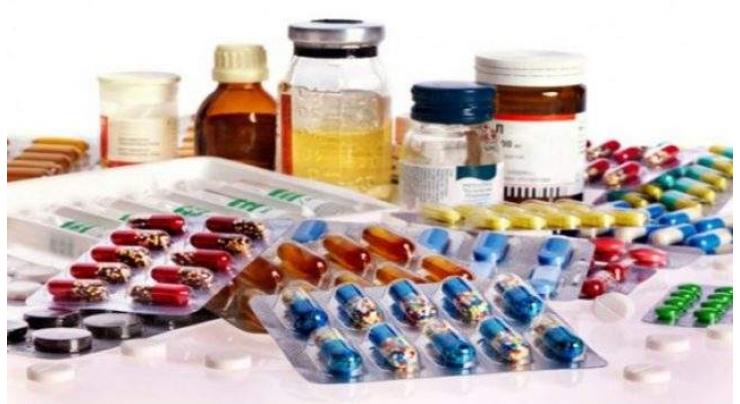
National Pharmacovigilance Centre Established To Ensure Drug Surveillance
Mohammad Ali (@ChaudhryMAli88) Published January 30, 2018 | 03:10 PM

The government has established National Pharmacovigilance Centre at Federal level to provide drug surveillance and complaint data from its usage and promote quality and authenticity
ISLAMABAD, (UrduPoint / Pakistan Point News - 30th Jan, 2018 ) :The government has established National Pharmacovigilance Centre at Federal level to provide drug surveillance and complaint data from its usage and promote quality and authenticity.
Provinces are also taken on-board for establishing this system which is also aimed at promoting patient safety by collecting data on adverse drug reactions as part of continuous monitoring and vigilance of marketed drugs in line with international practices.
The quality and authenticity of the drugs would be checked through its efficacy and safety data directly from health professionals. Official sources at National Health Services Division while giving details of steps taken to control sub-standard and adulterated drugs on Tuesday said Bar Coding System (Serialization) has been notified for prompt identification of spurious/counterfeit drugs by use of smartphone application by patient, retailer, wholesale and regulator.
The government has strengthened testing and analysis facilities to promote quality of medicine through various trainings for identification of counterfeit, sub-standard and falsified drugs. These facilities including Central Drug Laboratory (CDL), Karachi have been strengthened in collaboration with World Health Organization (WHO) and United States Pharmacopeia (USP).
WHO's pre-qualification of CDL is also under process and would be completed in coming months. The sources said for quality control checks, both Federal and provincial governments have their Drugs Testing Laboratories.
Federal government has one Central Drug Laboratory at Karachi while every province has also established its drug testing laboratories for verifying quality of drugs. There are eight (08) drug testing laboratories, five (05) in Punjab and one each in other three provincial Capitals.
Moreover, sale of drugs is under Provincial Governments and, thus, they issue Drug Sale License. There is a large number of Drug Inspectors in each province who survey and monitor market for compliance at large scale; whereas Federal Inspectors domain is to check manufacturing facilities.
Drug Regulatory Authority of Pakistan (DRAP), under Federal Government has initiated process of WHO pre-qualification of Central Drugs Testing Laboratory (CDL), Karachi to strengthen quality control of drugs used in the country.
WHO audit is expected in first half of 2018 to verify quality standards of this lab. Listing the DRAP's actions taken for implementation and enforcement of rules and laws, the sources said Federal and Provincial Drug Testing Labs tested/analyzed 53,371 samples till third quarter of 2017.
Among them, 446 (0.83%) samples were found sub-standard and 63 (0.11%) samples were declared as spurious cases. Cases are under prosecution. Moreover, the sources said 1452 cases were filed in drug courts and 884 cases were decided while 134 FIRs were registered against the accused who violated Drugs Act and Rs.
32 million were imposed as fine. Similarly, the sources said DRAP suspended/cancelled eight (08) drug manufacturing licenses of pharmaceutical units, suspended production activities of 16 pharmaceutical units and 784 GMP inspections of pharmaceutical units were carried out.
During year 2016, Federal and Provincial Drug Inspectors took 74,031 samples, out of which 813 (1.09 %) were declared sub-standard and 97 (0.13%) samples were declared as spurious. The sources said 3,446 cases were filed in drug courts and 2,446 cases were decided while 388 FIRs were registered and fine of Rs.
100 million was imposed. DRAP suspended/cancelled 11 drug manufacturing licenses of pharmaceutical units, suspended the production activities of 20 pharmaceutical units and 1059 GMP inspections of pharmaceutical units were carried out.
The sources said WHO has published guidelines for taking measures to combat menace of counterfeit drugs and develop strategies for substandard and falsified medical products. Rules have been put in place to ensure swift identification of counterfeit, spurious and falsified drugs in line with international standards and to eradicate illegal drugs from market. aa
Related Topics
Recent Stories

Selection committee dissolved over Pakistan women cricket team's poor performanc ..

Punjab CM Maryam Nawaz in police uniform at Chung police center

Currency Rate In Pakistan - Dollar, Euro, Pound, Riyal Rates On 25 April 2024

Today Gold Rate in Pakistan 25 April 2024

Mired in crisis, Boeing reports another loss

Session Awarding Ceremony 2024 held at Cadet College Muzaffarabad

Austrian ski great Hirscher to make comeback under Dutch flag

Pakistan, Japan agrees to convene 'Economic Policy Dialogue'

FM Dar conveys deepest sympathy on torrential rains devastation in UAE

Spain PM Sanchez says weighing resignation after wife's graft probe

Tennis: ATP/WTA Madrid Open results - 1st update

Long-lost Klimt portrait auctioned off for 30 mn euros
More Stories From Health
-

Vaccines save at least 154 million lives in 50 years: WHO
19 hours ago -

UHS to issue MBBS degrees within three months after final result
22 hours ago -

Rawalpindi woman gives birth to six babies
6 days ago -

DC calls for intensive anti-polio drive in ICT
7 days ago -

World Hemophilia Day observed to underscore importance of providing comprehensive care
8 days ago -

Six in a family with heart on the 'right side'
8 days ago
-

Diabetic disease increasing rapidly : Dr. Noor Elahi Memon
8 days ago -

World Hemophilia Day observed
8 days ago -

ATC dismisses bail petition of doctor involved in illegal kidneys transplant
16 days ago -

Dr. Shehzad warns against deviation from WHO guidelines on anti-smoking
16 days ago -

Health activists express concerns over attempts to derail tobacco control
18 days ago -

UHS declares MBBS first prof, MS urology exam results
27 days ago











